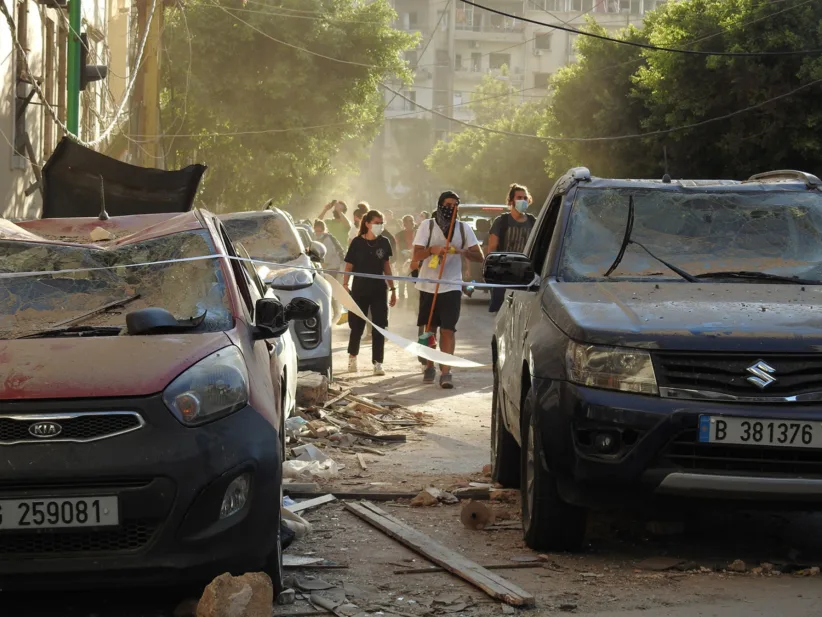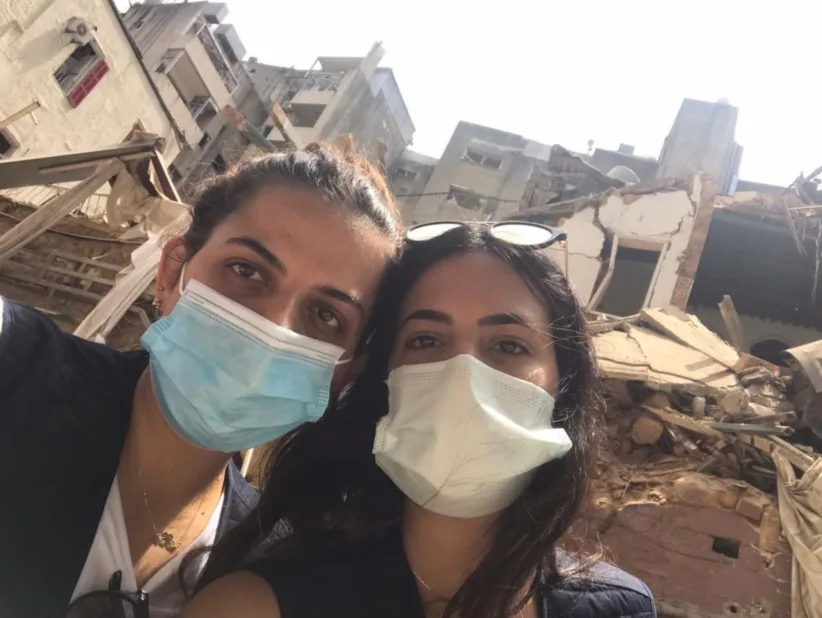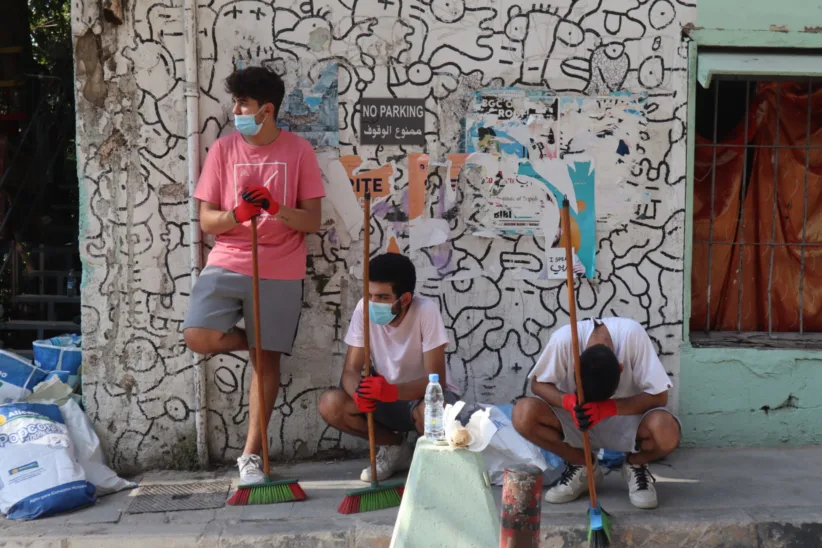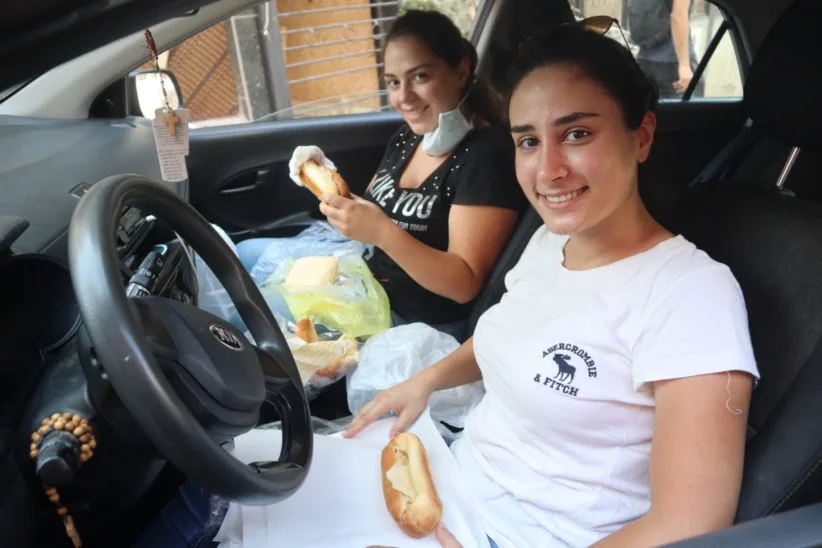“It looks as though an atomic bomb has gone off”
Beirut residents fled out into the streets to help after the enormous explosion that took place on 4 August. “The chaos is indescribable. Everybody in shock,” says Nagham Souki, programme coordinator for Norwegian People’s Aid.

Text: Sissel Fantoft
2750 tonnes of ammonium nitrate exploded at the port in Beirut. At present 157 people have been declared dead, more than 5000 are missing and several hundred thousand are homeless. The explosion was so powerful that it could be felt in Cyprus, more than 200 kilometres away, according to AP.
The windows and doors of the building where the Norwegian People’s Aid offices are located were blown out, even though it is several kilometres away from the scene of the explosion. All Norwegian People’s Aid staff in Lebanon are still working from home on account of the coronavirus situation, so nobody was on the premises on Tuesday afternoon. Nagham Souki lives in the Lebanon Mountains, 25 minutes’ drive from Beirut, and was at home with her family when the explosion occurred.
“I thought it was an earthquake. My mother, who grew up during the civil war, had a panic attack because she thought war had broken out,” explains Souki.

Building collapse fears
The dust had barely settled following the explosion before people took to the streets in order to help out with the aid effort.
“People of all nationalities are searching for survivors or carrying the injured and dead out of buildings. Local residents, local groups and representatives of NGOs have all hit the pause button on their lives. They are getting organised into small teams and trying to do whatever they can. Everyone is in shock and is moving around the streets quietly,” says Souki.
“There are collapsed buildings everywhere, and the streets are covered in shards of glass. This scene is absolutely indescribable, complete chaos. It looks as though war has raged here for a decade,” she adds.
Warnings have been issued to let people know that a number of buildings are at risk of collapse.
“Everybody is worried about that now. The infrastructure in the area affected was already weak, and many of the buildings are several storeys high and have no lifts. Residents are trying to get in so that they can collect some of their belongings, but the situation is dangerous. Many of them are asking people on the street to help them empty their homes before the buildings collapse,” says Souki.

Living a nightmare
Norwegian People’s Aid has been working in Lebanon on long-term development work and humanitarian measures since 1982, and has been clearing mines and cluster bombs since 2006. The staff have now relocated and more than 60 of them are on site in Beirut, volunteering to help clear the streets of debris following the explosion and helping to shore up buildings at risk of collapse and make them safe.
“Aid is needed urgently at the moment. We need to clear the streets and buildings to remove debris and shards of glass, find shelter for people who have lost their homes and help people who have lost everything by providing them with the basics,” says Souki.
At least three hospitals in Beirut were destroyed by the explosion, and a number of others were damaged. Lebanon’s hospitals were already hit hard by a financial crisis and the coronavirus epidemic. According to Worldometer, the country had 5672 registered cases of coronavirus and 70 deaths linked with it as at 6 August.
“People who were injured by the explosion and are seeking hospital care are being turned away because they do not have the capacity to offer treatment. Everybody who lives here knows somebody who knows somebody who has been affected. Lebanon is a small country, and right now it feels like we are living a nightmare – it looks as though an atomic bomb has gone off over Beirut,” she says.
Untenable situation
Financial crisis, widespread corruption, increased food shortages and the coronavirus crisis had already brought Lebanon to its knees. More than a million Palestinian and Syrian refugees live in Lebanon, many of them in refugee camps that are physically closed off due to fears of coronavirus spreading at the cramped facilities with their poor sanitary conditions.
Last year, people took to the streets in Beirut to protest against the increase in the cost of living, and Lebanon’s lockdown as a consequence of the coronavirus crisis had a devastating impact on people’s finances.
“The explosion is a massive trauma for the population and comes on top of the financial crisis, increasing unemployment and low levels of trust in the authorities. Many people had already lost their jobs, and now they have lost their homes as well. We thought things could not get any worse, but they have. And now the situation is more untenable than we could ever have imagined,” says Nagham Souki.
“The authorities’ job is to protect its citizens, but we cannot rely on our government. We know they are responsible for what has happened, and now we no longer feel safe in our own homes,” she adds.

Cross-platform mobilisation
One small glimmer of light in the Beirut nightmare is the sense of fellowship characterising the aid initiative on the streets. As it turns out, social media has an effective part to play as a way of conveying information through the chaos.
“Various hashtags began to appear on Instagram directly after the explosion, started by individuals or small groups of people. The #openhouseslebanon hashtag, for example, is allowing people to indicate that they can offer shelter to families or individuals in their private homes, or they can provide information about hotels and empty apartments. Everybody is doing what they can to help,” explains Souki.
People are using the Instagram account #locatevictimsbeirut to send in pictures of loved ones who are missing.
“Both the power supply and Wi-Fi were disabled in the affected area after the explosion,which made communication extremely difficult. Many injured people were unconscious when they were sent to hospital, and finding their relatives is hopeless as they have no ID. That is why such creative measures are important,” she says.
The Mar Mikhael district is located right next to the harbour where the explosion took place and is normally full of restaurants and cafes.
“This is one of the most colourful parts to be found anywhere in Lebanon. It is normally full of both tourists and locals who head their to forget their cares for a little while. It was the happiest place in Beirut, full of laughter and music, and now it is a colourless disaster zone,” says Souki.
Independent review
Nagham Souki feels that the future for Lebanon is even bleaker following the explosion.
“Poor people have become even poorer, and many of them have lost their homes. No insurance can cover what they have lost, and I have no idea how people are going to get back on their feet,” she says.
Even though she has been volunteering on the streets from morning to night’s explosion, Nagham Souki is experiencing an emotional numbness.
“Experiencing something like this is a shock, a major trauma. I wake up every morning and feel nothing, except for pain and enormous disappointment in the authorities,” she says.
Now Lebanon needs all the aid it can get from the international community.
“Initially, extensive emergency aid is needed to help the victims by providing food, water and shelter. In the longer term, an independent international investigation is needed to find out how this could happen and who is responsible. We cannot count on the Lebanese authorities being able to implement an objective review,” states Naghim Souki.
